It's even sadder and scarier to see a guy in his 20s fall into a pattern of repetition.
A valid and fair observation. However...I would agree to the point that most costumed vigilantes have a slightly self-destructive streak.
Slott is saying that Peter Parker is more self-destructive than other heroes. He explicitly said that, in comparison to the likes of Superman, Batman, Iron Man, Thor.Especially ones like Peter or Matt Murdock who really put every part of their lives in peril on a regular basis.
That cannot help but become a statement about class, i.e. making out that poor people make for self-destructive superheroes.
I am highlighting the subtext of what he says in that context. He explicitly defines Peter's main trait as being exceptionally self-destructive compared to other heroes.No, that's not what he's saying. You're so eager to jump on Slott that you're making his statements into something else entirely.
Slott is saying that Peter is self-destructive and defines that as someone who "trips and fails" and even says that Spider-Man represents the self-destructive traits of people in your life, and your friends' life.Slott is not saying that Peter is wrong or a horrible person.
Slott explicitly says that being self-destructive is more defining for Peter than being responsible.He's saying that Peter's sense of responsibility and his concern for others is so great that he is willing to continually put himself in harm's way in order to do good.
Slott: "But, to me, the fun of it is, at his basic core, even if you strip away "with great power must come great responsibility," what makes Peter Parker this character that resonates with all of us is that he's really the first character who's you. He's the guy you know. He's not a wealthy billionaire playboy, he's not an alien from another planet, he's not a god from a pantheon. He's the guy down the block who trips and falls, who screws up in every way that you screw up. All the self-destructive traits that you have, and your friends have, he has."
Slott says that Peter's basic core is being self-destructive. That's exactly what he is saying here.
To bring this back to Brevoort...if you read his manifesto, he actually said at one point that Peter being about youth is more his core than him being responsible...even saying that the stuff about responsibility was introduced to justify his marriage and make him an older character. Which is again absolutely untrue and inaccurate and easily refutable. Both Brevoort and Slott overwrite the actual core of the character underlined in the founding story by claiming that Peter Parker is about youth or being self-destructive (which is palatable because of his youth). When the original story is about responsibility and the actual stories that followed from Ditko through Romita through Conway, and even Stern...is about class.
Results 31 to 45 of 178
-
04-03-2020, 10:11 AM #31BANNED

- Join Date
- Dec 2018
- Posts
- 9,358

-
04-03-2020, 11:01 AM #32

I'm fine with Peter making mistakes as long as he's not a colossal idiot about them and is still a competent hero.
-
04-03-2020, 11:10 AM #33

As far as Ditko's intentions and Spider-man making mistakes, I do recall one instance of Ditko saying flat out that heroes don't make mistakes. Then when he was immediatly asked about Spider-man, he said "He's still a kid."
Of course if you read the kind of character that Ditko would later write as heroes, you might not want to hold his opinions on the matter in that high of a regard.
-
04-03-2020, 11:15 AM #34BANNED

- Join Date
- Apr 2014
- Posts
- 7,499

Peter isn't just a guy. He's a fictional character who is going to remain at a certain age for the duration of his existence.
It's not that he's in a cycle of repetition as a real person, it's that the stories that work best for Peter are ones that keep at a certain point in his life.
No, it's not. He's not saying that at all. You want to make it about that but it's not.
And you're taking that as a slam against Peter, rather than something that highlights his selflessness.
Don't most people "trip and fall?" Isn't seeing how Peter does that and keep getting back up what makes him inspiring as a character?
Well, again, you're perceiving it as some horrible insult and clearly it isn't meant as such.
No, he isn't. You're completely misreading what he's saying.
He's saying that, like us, Peter's not perfect. That he screws up. That he has self-destructive traits, like most of us do, and that just makes him easy to identify with.
He's not at all saying that Peter is, at his core, a self-destructive person. He's simply saying that, like most of us, can have traits that can trip us up.
The original story is about being young and making mistakes.
Peter learns a lesson about responsibility but that is due to his making a callow, youthful mistake that leads to tragedy.
And, as noted above, Slott is not saying that Spider-Man is "about" being self-destructive. That is a misreading on your part.
-
04-03-2020, 11:47 AM #35BANNED

- Join Date
- Dec 2018
- Posts
- 9,358

The main question is did Ditko object to Peter graduating high school and going to college, when he wrote the character in the '60s? The answer to that is no. There's no evidence that he did, and considering that Ditko had major say on the plotting of Spider-Man at that time, if he objected to it, it would likely not have happened or at the very least not made into a major part of his work. I mean Ditko has a history of sabotaging Stan Lee's ideas which he objected to. Like deliberately botching a Spider-Man and Human Torch team up which he felt was one too many (https://www.cbr.com/spider-man-team-...tko-protest/2/).
The Master-Planner Saga is explicitly about Peter growing up. It's a valediction of the character. It's about him going to college, leaving high school, getting a pay rise from Jameson (based on Ditko's own negotiations with Lee's Uncle Martin Goodman). And even Lee admitted, back in the '60s that this was story was more Ditko than Lee. Ditko couldn't have had issues with Peter graduating and then make his first issue as a college student so explicitly about a change in his life and put so much weight, craft, and stuff into it.
Well the problem is that Brevoort is citing Ditko to justify this big change as being true to the character. That of course opens the can of worms of why take Ditko's word over Stan Lee (who never had issues with Spider-Man growing up), and why take Ditko's words on this rather than all the stuff he wrote about Randian objectivism later on. Fact is you always have to qualify stuff, and you have to be careful about this, but nobody involved in that period of Spider-man bothered with that. There's a deep level of denial, bad faith, and general mendacity on the part of everyone involved in OMD and BND. Like they cite Ditko on this one thing they agree with while discounting all the other stuff he said, or what they thought he might have said. I mean Stan Lee was quite explicit, multiple times that Peter should grow and change, and he was for the marriage, so they had to find some other way of claiming this was true to the origins. When in fact what it is is a craven corporate ploy to justify inferior storytelling on one side, and a lame attempt to justify an entirely personal take on the part of one generation of Marvel fans as being truer than that of other generations that came after, i.e. a kind of cultural gatekeeping.Of course if you read the kind of character that Ditko would later write as heroes, you might not want to hold his opinions on the matter in that high of a regard.
I mean the biggest thing when Brevoort claims that Spider-Man is about youth and that's true to the character. That's as good as saying that people who grew up reading a married Spider-Man read a Spider-Man that wasn't true to the character. It's a line-in-the-sand separating one fans from another and claiming one is right over the other.
Either you are conflating or Slott is conflating...but this bears repeating...Selflessness and Self-destructive behavior are two entirely different and entirely separate things.
Words mean something. When someone says self-destructive, and Slott said the word "self-destructive" that doesn't mean selfless behavior. Or at least it's not reasonable to expect readers to come away thinking the writer means selfless behavior.
For people keyed to Slott's general vocabulary and so on, as you do, I expect you to at least qualify by saying "Slott has a problem of using the word self-destructive when he means selfless" as a proffer when making a defense.
It does seem that Slott generally doesn't seem able to separate selfless behavior from self-destructive behavior. Like in this interview with Syfy Wire (https://www.youtube.com/watch?v=ol4_T-gnqY4&t=343s) he calls Peter a "self-destructive smart character" and then catches himself and said, "Not self-destructive in that he does the right thing even when it hurts him"...but again it's a major problem if a writer's first instinct is to describe selfless behavior as self-destructive and it's a major tell that you are getting a very personal, idiosyncratic interpretation of the character and not one true to the actual core of the character as written.Last edited by Revolutionary_Jack; 04-03-2020 at 11:54 AM.
-
04-03-2020, 12:45 PM #36Mighty Member

- Join Date
- Dec 2014
- Posts
- 1,411

Slott's statement definitely reads as "Peter resonates because he has self-destructive traits like your average person." If one is trying to argue that Peter is self-destructive because he risks his life or sacrifices his success to save others, then:
A.) That's definitely nowhere near the "self-destructive traits" that the average person ("you and your friends") might exhibit. Peter is far more altruistic and responsible than the average person who would probably "self-destruct" as a result of self-absorption, poor impulse control, low self-esteem, a lack of awareness/understanding, or, if pervasive enough, mental illness (like addiction, BPD, ADHD, etc.).
B.) Every superhero, in one way or another, becomes self-destructive by that definition. So it is no more characteristic of Peter Parker than it is of the genre, which makes the entire point moot.
Anyway, it's clear that Slott misspoke when he made that statement, and that he just meant to say that Peter resonates with readers because he struggles. Like most Peter struggles to achieve success and sometimes outright fails despite his best efforts. He "trips and falls." That has little to do with self-destruction or making mistakes, and more to do with reality. Life isn't fair, good deeds are sometimes punished, and things don't always work out in our favor. We can't all be a billionaire playboy.Last edited by Spider-Tiger; 04-03-2020 at 02:30 PM.
-
04-03-2020, 12:49 PM #37

Listening to Part 2...
- Here's the memo he's talking about.
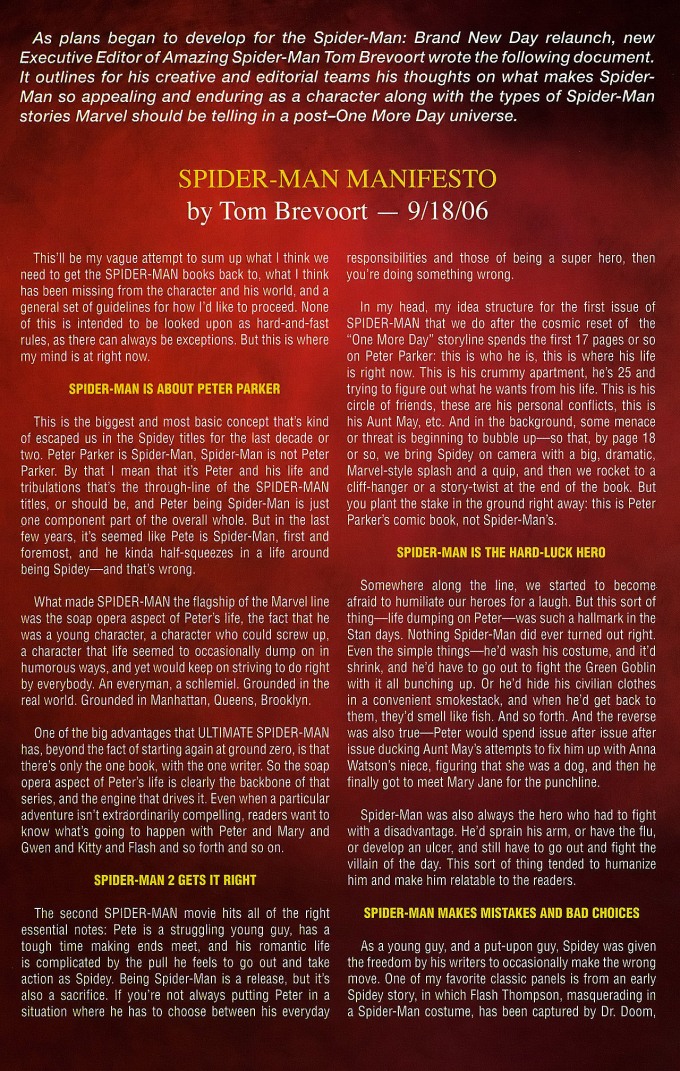
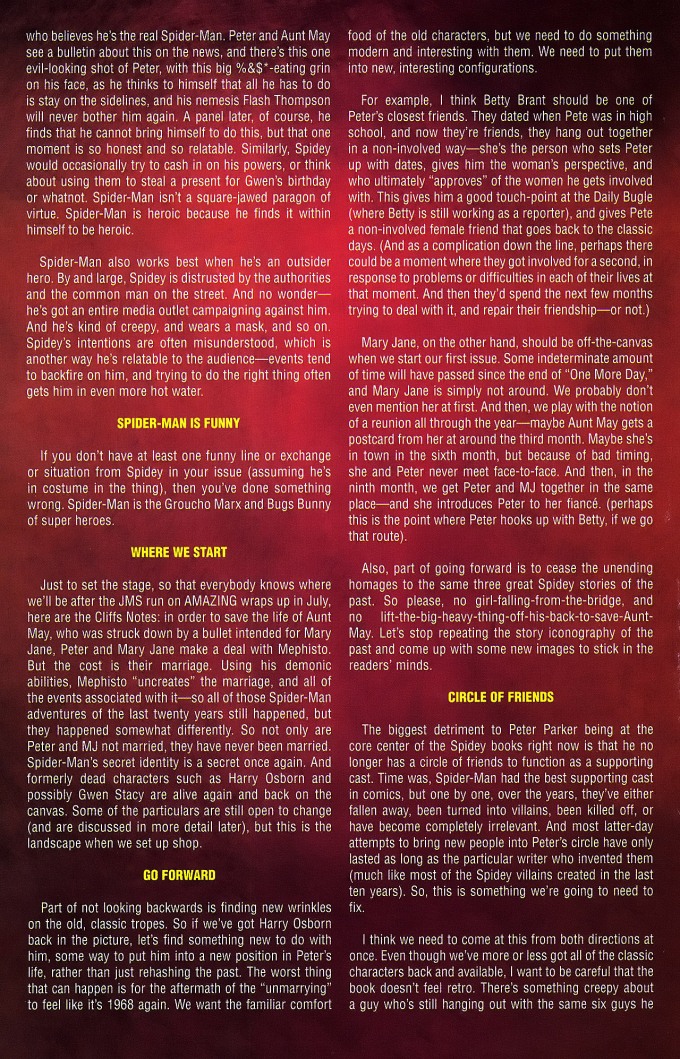
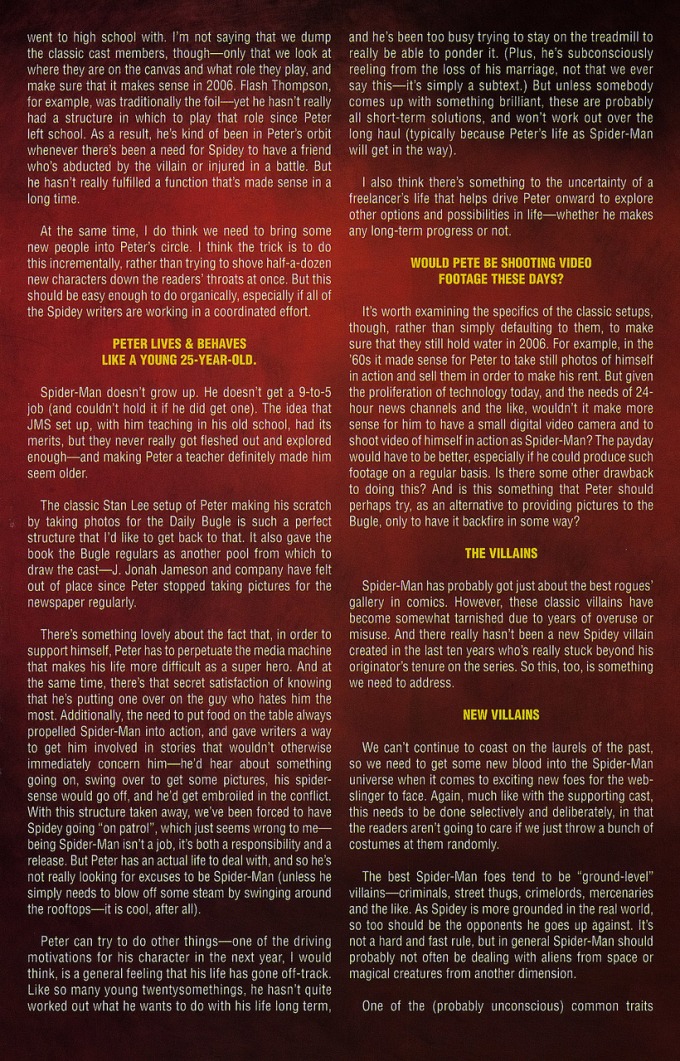 Sincerely,
Sincerely,
Thomas Mets
-
04-03-2020, 12:50 PM #38

Continuing with the Brevoort manifesto....
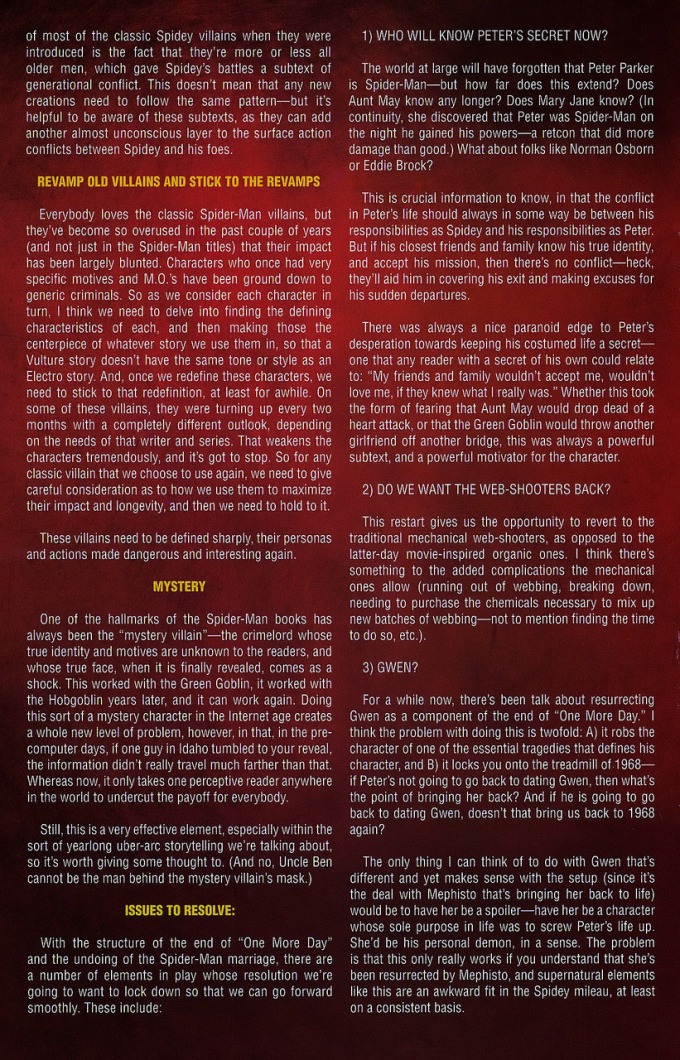
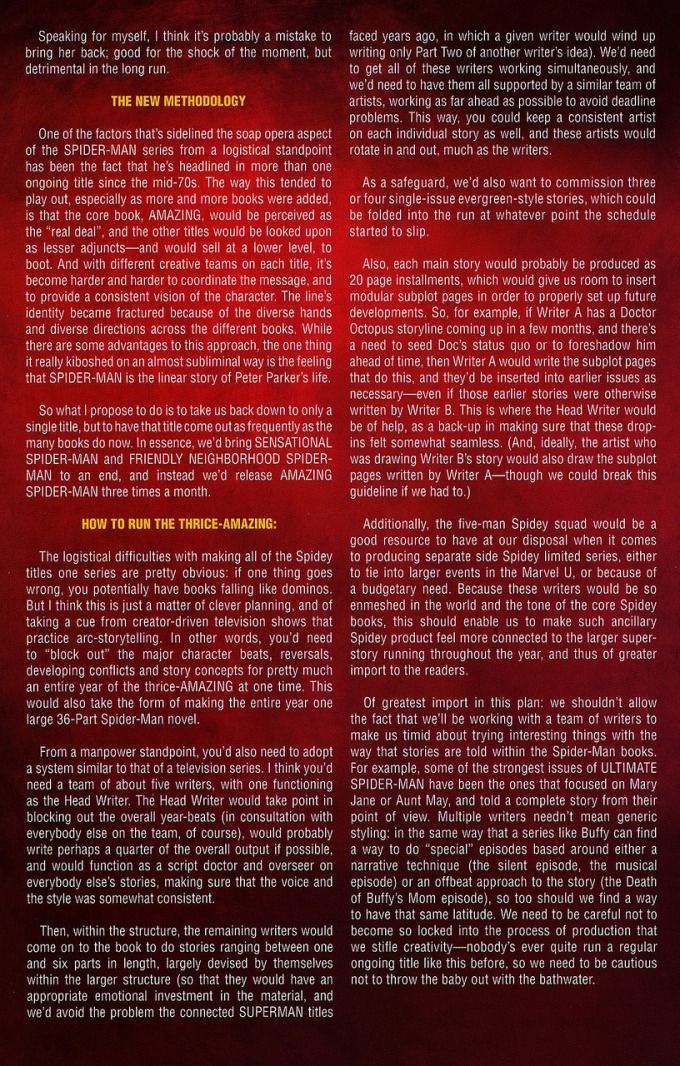 Sincerely,
Sincerely,
Thomas Mets
-
04-03-2020, 01:27 PM #39

This one is a lot more about his views on Spider-Man.
For the first 13 minutes he talks about his views on Spider-Man, and the manifesto/ memo that was key to Brand New Day.
14 minutes in, he is asked how "Into the Spiderverse" touches on the question of whether youth is key to Spider-Man. His view is that the series is still about youth, just someone other than Peter Parker.
He's curious about what the sequel is going to do.
Then there's a discussion of the impact of the MCU, and how it should influence the comics. His view is that the comics are the raw material for the future films.
24 minutes in there's an interesting question on Disney's role. Brevoort's response was "Disney brought Marvel so Marvel could be Marvel."
32 minutes in, he's asked about the best Spider-Man story. His view is that it's the Master Planner saga, as it's the story all later ones have been chasing. He doesn't think that the people who say Kraven's Last Hunt are wrong.
36 minutes in, he's asked about his favorite story of his tenure. He admits it's difficult because he can't look at any of those objectively. He mentions a few one-offs: the JMS/ Romita Jr 9/11 issue, Dan Slott's last Amazing Spider-Man and Zdarsky's last Spectacular Spider-Man, before praising the run-up to 700, especially the reveal in the Dying Wish Prologue (698) and the whole Superior Spider-Man run.
The final question (38 minutes in) is what it means for him personally to be part of Marvel's legacy, and his answer on being proud to be able to stand on the shoulders of giants is relatively standard but nice.
I'll note in the summaries I am cutting some nuance and comments about others who deserve credit (IE- He discussed Steve Wacker as having a bigger role in Brand New Day than he did; He noted the MCU creators do obviously bring in their own ideas as well.)Sincerely,
Thomas Mets
-
04-04-2020, 08:49 AM #40BANNED

- Join Date
- Apr 2014
- Posts
- 7,499

With a character who's been around as long as Spider-Man and who has as many passionate fans as Spider-Man does, you can't please all of them. You just can't.
If you're editing or writing that character you have to do what you feel serves the character best. Some fans will inevitably disagree but that's the way it goes.
Well, sure. But with the full quote from Slott, it's easy to see exactly what he was talking about.
Yes, and you regularly seem to misinterpret them!
No, reading the full context of what Slott said he's referring to self-destructive behavior but he's also not saying that Peter is, at his core, a self-destructive person. You seized on that word and isolated it without really taking the full meaning of what Slott is saying into account. He's simply saying that Peter has the same flawed qualities that we all do and that, like all of us, he is capable of sabotaging himself, or "tripping himself up."
Given the larger quote, I would say Slott doesn't have a problem using the word. He used it just fine. It was my assumption, prior to reading the fuller quote, that Slott was equating self-destructiveness with selflessness. But he isn't. I do think that is a legitimate way to characterize some reckless behavior from vigilantes like Spider-Man or Daredevil, that they are so heroic to a fault that they don't consider their own safety but that is not what Slott is referring to in this instance.
There are many ways to interpret Peter's character and still be true to who he is. There's no way to have so many writers handle him over the course of many decades and have every one of them be absolutely 100% in synch. Slott's take is as valid as anyone's.Last edited by Prof. Warren; 04-04-2020 at 08:52 AM.
-
04-04-2020, 09:04 AM #41BANNED

- Join Date
- Dec 2018
- Posts
- 9,358

Yes, but if you take that stance, you should expect to face consequences. And one consequence is that your version or regime over the character will always be controversial, polarizing, and divisive. If you want to make an attempt to rise above that, you need to offer solid and believable reasons. One of those reasons is what Brevoort does - offer a fact claim. If you are offering a fact claim to sell something then it better be backed up by evidence and not be so easily debunked. Since it isn't, then that means that Brevoort and others didn't do enough or didn't care enough about what they were doing and who they were hurting with their project.
What Slott does is imply that Peter being selfless is sabotage. That's not sabotage at all. Actual self-sabotage behavior involves some form of mental illness, addiction (to alcohol, to drugs), toxic behavior (cheating on your partner, stealing from your friends), depression and so on.He's simply saying that Peter has the same flawed qualities that we all do and that, like all of us, he is capable of sabotaging himself, or "tripping himself up."
It's one thing to say that Peter is more relatable than other heroes, for all kind of legit reasons, such as him coming from a poor background and having limited resources, but quite another to characterize that as him being some kind of screwup...because that is very much the narrative about poor people having personality disorders and making mistakes (and so their poverty is justified and deserved). Iron Man has always been far more individually self-destructive than Peter Parker ever has been or ever will be, whether it's his alcoholism, his womanizing, his hubristic plans that backfire multiple times (CIVIL WAR, Illuminati, World War Hulk) and yet like all rich people he gets multiple second chances from readers and others, and is still characterized as someone to aspire to.
Slott's run and the BND in general, as can also be seen in Brevoort's manifesto, completely misread the character. Like for instance, Brevoort said that Peter Parker is funny and compared him to Bugs Bunny...well here's the thing, people laugh with Bugs Bunny never at him. Whereas in fact in most of Slott's run, and his description of Peter, applies to Daffy Duck, the character who self-sabotages, overreaches, and is the guy we laugh at.
It's valid so long as Slott admits that it is his take, and he has awareness that his take is weird and idiosyncratic.There's no way to have so many writers handle him over the course of many decades and have every one of them be absolutely 100% in synch. Slott's take is as valid as anyone's.
Like when Hickman wrote the Avengers, he was fairly open that it was a little weird from what people expect, or when he took over the X-Men he said that while it was grounded in what came before he was going to tweak and shift it to make people uncomfortable. He wasn't under illusions that he was doing something traditional.
Whereas Slott's run and BND before was sold under the idea that it was true to the character or some version of it, or true to the original Spider-Man by Lee-Ditko or some other stuff...when what it was, was completely made up with no connection to anything that came before.Last edited by Revolutionary_Jack; 04-04-2020 at 09:24 AM.
-
04-04-2020, 11:09 AM #42BANNED

- Join Date
- Apr 2014
- Posts
- 7,499

They have offered reasons. The pro-marriage crowd doesn't care about any of the rationale. Any reasoning that is offered, and plenty has been, is dismissed out of hand.
Also, who are they actually "hurting?" No one. So some fans would prefer that Peter still be married or this or that - so what?
As I said, you can't please everyone.
You're trying to manufacture an issue where none actually exists. Absolutely no one who has written Spider-Man has ever implied that because Peter is poor that he has a personality disorder or even that he has a personality disorder at all. It's generally agreed that when anyone refers to Peter as a "screw-up," it's with the understanding that he reflects the imperfections and failings that we all are capable of. And Tony is certainly not held up as anything more than Peter to aspire to. His personal faults are on full display.
Peter is really both Bugs and Daffy. When he's Spider-Man, we laugh with him. When he's Peter's his misfortunes are often the source of humor.
Who else's take would it be that he's talking about when talking about his own opinions?
And that take is not weird or idiosyncratic in any way. You're grossly exaggerating what he's saying simply to portray it as controversial.
I would say a great many fans would say they can see the connection very clearly to what came before.
People seem to forget that when Romita Sr. took over from Ditko it was legitimately jarring. The book suddenly felt very different from what it had been.
Spider-Man has always changed through the many hand offs from one creative team to another.
They all leave their own mark on the character while trying to retain what they perceive as essence of Spidey. Slott's run is no different in that regard.
-
04-04-2020, 12:00 PM #43BANNED

- Join Date
- Dec 2018
- Posts
- 9,358

Because a lot of those justifications are based on misinformation, fabrication, deception, and denial. Speaking as a consumer, in all my years as a comics fan, I have never experienced any moment where a publisher outright lied to the extent Marvel Editorial and Marvel Corporate did over OMD and BND where they and others actively spread misinformation to A) justify what they did, B) slander the entire era before so they can frame what they are doing as a rescue.
If you have to lie so much to get what you want, then what you want is probably not something worth having, or something good to start with. They wouldn't have had to lie if they had a good story and a good product to offer. If OMD and BND were genuinely good to great, none of this would be needed. After all whenever Peter grew up and had a major change, you immediately had a great story.
-- The first story after Peter graduated high school...the Master Planner Saga.
-- The first story after Peter and MJ got married...Kraven's Last Hunt.
Both of which would never have been possible in the shape they now exist had Peter remained in high school. And yet it is these stories that even Brevoort, completely lacking in self-awareness, considers the best Spider-Man stories.
So if you are making a major change to the continuity as OMD did...you need to step up to the legacy of previous precedents. It's reasonable to allow that it would be hard to be as great as ASM#31-33 and KLH, however it is more than reasonable to condemn a story for being as bad and as insulting as OMD. And it is definitely reasonable if the people behind this continue to justify it by repeating easily debunked lies.
And Romita Sr. admitted that both at the time and after, that there was a change. He never lied or pretended that what he was doing was being truer to Spider-Man than even Ditko.People seem to forget that when Romita Sr. took over from Ditko it was legitimately jarring. The book suddenly felt very different from what it had been.
Whereas Brevoort and Slott claim that about their takes on the character and his world.
It's not an implication anyone would outright intend, but it shows up in their work, and their attitude without people being aware of it. People across history have been geared towards mocking and treating poor people with humor while making rich people come of as serious and grand.Absolutely no one who has written Spider-Man has ever implied that because Peter is poor that he has a personality disorder or even that he has a personality disorder at all.
If you think Peter Parker is relatable more than Iron Man or other billionaire superheroes because he's self-destructive than that implies a level of thoughtlessness or lack of awareness. Because Iron Man, and certainly Batman Post-Crisis, have major self-destructive traits far more than Peter does. So the obvious leap is that people perceive Iron Man or Batman as more capable because of their wealth.
How can Peter be a screw-up in the same universe where Hank Pym exists? Because Hank Pym is an actual screw-up and the actual cautionary tale in the Marvel Universe.It's generally agreed that when anyone refers to Peter as a "screw-up," it's with the understanding that he reflects the imperfections and failings that we all are capable of.Last edited by Revolutionary_Jack; 04-04-2020 at 12:11 PM.
-
04-04-2020, 01:23 PM #44Mighty Member

- Join Date
- Dec 2014
- Posts
- 1,411
-
04-04-2020, 03:13 PM #45BANNED

- Join Date
- Apr 2014
- Posts
- 7,499

Some people are clearly very over-sensitive to the term "screw-up" and perceive it as some horrible, slanderous term. It isn't. No one uses it in regards to Peter as a put down. If anything it's a term of affection, as in he's " a lovable screw-up." Maybe calling him an underdog would work better for some fans.




 Reply With Quote
Reply With Quote

